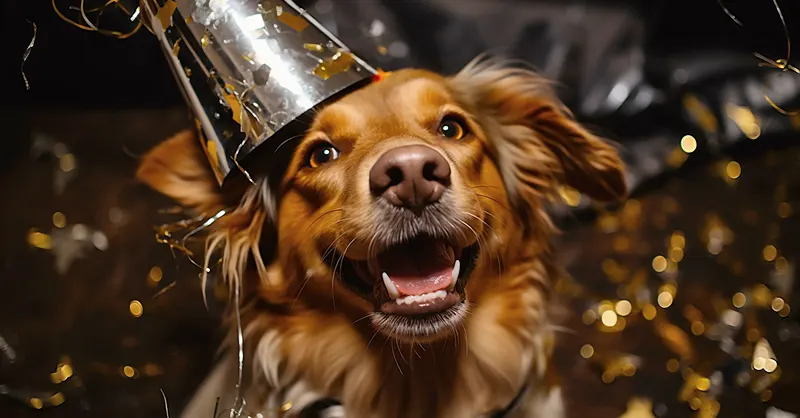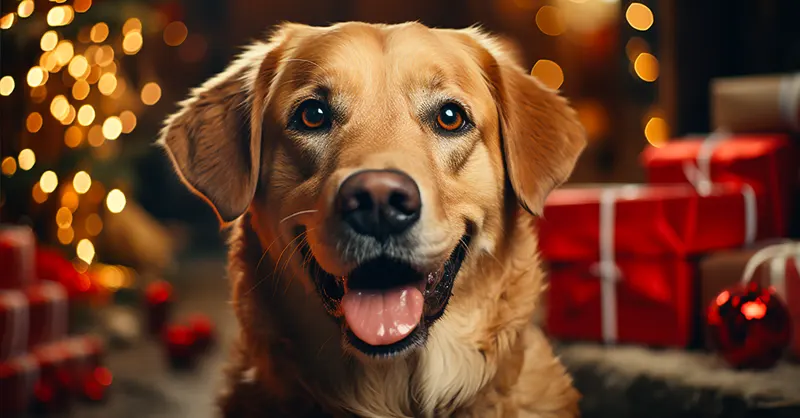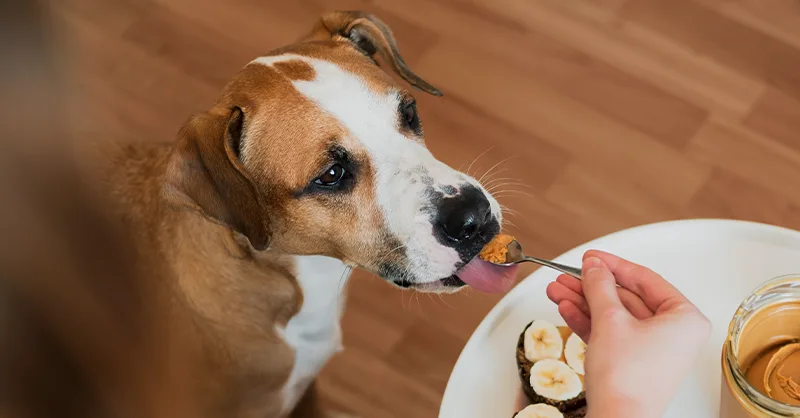Archive for the ‘Dogs’ Category
New Year’s Eve can be stressful for dogs due to fireworks and changes in their environment. Understanding and preparing for these challenges can help ensure a safe and comfortable holiday for your furry friend.
Why Dogs Fear FireworksDogs’ fear of fireworks is mainly due to their loud and unpredictable nature. Dogs have more acute hearing than humans, making the intense sound of fireworks particularly startling and distressing. The unexpectedness of fireworks – sudden loud noises and bright flashes without a discernible pattern – can also trigger a dog’s instinctual flight response.
However, not all dogs react the same way. Some may be more desensitized to loud noises or may have temperaments that are less prone to anxiety. Factors like a dog’s age, environment, upbringing, and breed can influence their reaction to fireworks. Dogs with prior positive associations with loud noises or those who have been gradually exposed to similar sounds in a controlled manner may exhibit less fear.
Dog Reactions to FireworksIt’s essential to observe your dog’s behavior and offer comfort and security. Common signs of distress in dogs include trembling, hiding, whining or barking, pacing, drooling, attempting to escape, and changes in normal behavior.
Some dogs might even refuse to eat or lose control of their bladder. Monitoring your dog’s behavior closely during fireworks and providing comfort and a safe environment is crucial.
Share this image on your site (copy code below): <div style="clear:both"><a href="https://www.servicedogcertifications.org/new-years-dog-safety/" target="_blank"><img decoding="async" style="max-width:100%;margin:0 0 10px;" src="https://www.servicedogcertifications.org/wp-content/uploads/2023/12/How-to-Keep-Your-Dog-Safe-During-New-Years.jpg" title="How to Keep Your Dog Safe During New Year's" alt="New Year's celebration and firework safety tips for dogs" border="0" data-src="" /></a></div> Copy
Solutions for Firework Anxiety Comfort and Reassurance: Stay with your dog to provide comfort. Speak calmly and reassuringly. Safe Space: Create a quiet area where your dog can feel secure, away from noise. Sound Therapy: Use soothing music or white noise to help mask the sound of fireworks. Thunder Shirts: These special vests apply gentle, constant pressure, similar to swaddling, which can calm anxious dogs. Medication: In severe cases, consult your veterinarian about using anti-anxiety medications or sedatives. Behavioral Training: Desensitization and counterconditioning techniques can gradually reduce a dog’s fear of loud noises. Proper Identification: Ensure your dog has up-to-date ID tags and microchips in case they become frightened and run away. Other New Year’s Celebration Tips Food Safety: Avoid giving dogs human food, especially chocolate, grapes, onions, garlic, and foods containing xylitol. Alcohol: Keep that Champagne out of reach. Dogs should never consume alcohol. Party Favors: Loud noise makers can startle dogs, so keep them away. Guests and Parties: Monitor your dog around guests, especially if they are not used to crowds. ConclusionBy understanding and addressing the unique challenges of New Year’s Eve, you can help your dog have a safe and stress-free holiday. Remember, a little preparation can go a long way in ensuring a happy start to the new year for you and your pet.
Hello, dear pet parents! Christmas is a wonderful time to celebrate with our furry family members. But amidst the cheer and festivities, it’s crucial to keep our four-legged friends safe. Let’s explore how to make this holiday season delightful and secure for your pooch.
Pet-Safe Christmas FoodsDuring the holidays, there is always an abundance of delicious food around. Be mindful of the foods that your dog has access to. Here are some common holiday foods:
Candy Canes: Candy canes often contain high levels of sugar, which can be harmful to dogs, potentially leading to obesity and dental problems. Some candy canes may also contain xylitol, a highly toxic sweetener to dogs. Additionally, the hard texture of candy canes poses a choking hazard and can damage a dog’s teeth. Baked Ham: That sweet glaze on baked ham is a no-no for pooches. Too much sugar and fat could lead to an upset stomach or worse. Stick to their regular treats, even if those puppy eyes are convincing! Sugar Cookies: These are too sugary for dogs and often contain ingredients that aren’t dog-friendly. Plus, those cute shapes are more fun for humans than for doggie diets. Eggnog: This holiday favorite often contains milk, sugar, and sometimes alcohol – all things that dogs should avoid. Instead, maybe whip up a dog-safe version with plain yogurt and a sprinkle of cinnamon. Gingerbread: While ginger isn’t toxic to dogs, gingerbread cookies contain sugar and fats that are unhealthy for them. Not to mention, some recipes include nutmeg, which can be harmful to dogs in large amounts. Roast Beef: Plain and lean roast beef in small amounts is usually safe. Avoid fatty cuts and any seasoned with garlic, onions, or heavy spices. Mashed Potatoes: Plain mashed potatoes without added butter, milk, garlic, or onions can be okay. However, these additions, common in holiday recipes, can be harmful to dogs. Gravy: It’s often too rich and fatty for dogs and may contain harmful seasonings. Best to avoid. Fruitcakes: Generally unsafe due to ingredients like raisins, nuts, alcohol, and sugar. These can be toxic or cause health issues in dogs. Cooked Turkey: A small slice of plain, cooked turkey is a protein-packed treat. Just be sure it’s free from garlic, onions, and heavy seasonings, which can upset their tummy. Pumpkin and Cranberries: Small servings of plain pumpkin and cranberries are fine, but steer clear of sugary pie fillings and cranberry sauce.Share this image on your site (copy code below): <div style="clear:both"><a href="https://www.servicedogcertifications.org/christmas-dog-safety/" target="_blank"><img decoding="async" style="max-width:100%;margin:0 0 10px;" src="https://www.servicedogcertifications.org/wp-content/uploads/2023/12/How-to-Keep-Your-Dog-Safe-During-Christmas.jpg" title="How to Keep Your Dog Safe During Christmas" alt="Pet safe and toxic foods and other Christmas party tips" border="0" data-src="" /></a></div> Copy
Christmas TreesEnsure the tree is securely anchored to prevent it from tipping over if your dog bumps into it or tries to climb it. Pine needles, if ingested, can be harmful, so it’s a good idea to vacuum them regularly. Additionally, the water in the tree stand may contain preservatives that can be toxic to dogs, so keep it covered.
Christmas LightsKeep electrical cords from lights out of reach, as chewing on them can lead to electric shock. Also, be mindful of ornaments and lights at the lower levels of the tree, which could be within your dog’s reach. Those shiny baubles and tinsel can be tempting for a curious snout but can lead to choking or intestinal blockages if swallowed.
Overall, regular monitoring and preventive measures can help ensure your dog’s safety around these holiday decorations.
Managing Guest InteractionsDogs can get overwhelmed with too much attention. Set up a quiet, cozy space where your dog can retreat if the festivities get too much.
With all the coming and going, your dog might sneak out. Keep an eye on doors and perhaps set up a baby gate to prevent unexpected adventures.
Preparing Your DogConsider your dog’s personality. If they’re not fans of big gatherings, respect their space and comfort. A good walk or play session before guests arrive can help burn off excess energy.
Have a special, quiet place for them to retreat to, like a bedroom or a crate with their favorite toys.
ConclusionWith these tips, you can ensure a safe, happy Christmas for your beloved pup. Remember, the best gift you can give them is your love and protection. Happy holidays!
Hey there, dog lovers! Have you ever wondered if sharing your peanut butter sandwich with your furry friend is okay? In this article, we’ll dig into what science has to say about dogs and peanut butter.
Peanut butter: a yummy treat for dogs?Most dogs wag their tails at the smell of peanut butter. It’s not just tasty but can also be a good source of protein, healthy fats, vitamins B and E, and niacin for our four-legged friends. But hold on! Not all peanut butter is safe for dogs.
The Good Stuff: Safe Peanut Butter for DogsWhen picking peanut butter for your pooch, go for the plain, unsalted ones. These are the best because they don’t have extra stuff that can be bad for dogs. Some good brands that are dog-friendly include:
Whole Foods 365 Everyday Value Organic Peanut Butter Trader Joe’s Peanut Butter (No Salt) Teddie Super Chunky Peanut Butter Poochie Dog Peanut Butter Smucker’s Natural Peanut Butter Teddie All Natural Peanut Butter Crazy Richard’s Peanut ButterWhile both chunky and smooth peanut butter are generally safe for dogs, smooth is often a safer choice. Chunky varieties can pose a choking hazard, especially for smaller dogs.
Another wonderful alternative is to make your own peanut butter! It’s quick and easy. Start by roasting 2 cups of shelled and skinned peanuts in an oven at 350 degrees Fahrenheit for about 10 minutes until they are lightly browned. Let them cool slightly, then transfer them to a food processor. Blend for about 5 minutes or until the mixture becomes smooth and creamy. You and your dog can enjoy your healthy, homemade treat!
Homemade peanut butter can be a great and healthy alternative for you and your dog. Warning: Xylitol is a No-No!Now, this is super important. Some peanut butter use a sweetener called xylitol. This is very dangerous for dogs, even in small amounts. It can cause low blood sugar, seizures, liver failure, or even death. So always check the label to make sure there’s no xylitol.
The following peanut butter brands have been known to contain xylitol:
Go Nuts, Co. Krush Nutrition Nuts ‘N More P28 Foods How much is too much?Even with safe peanut butter, remember it’s a treat, not a meal. Giving your dog too much can lead to weight gain and other health issues. A little dab on their toy or a small spoonful as a treat is plenty.
Benefits of Peanut Butter for DogsApart from being a yummy snack, peanut butter can be a handy tool. It’s great for hiding medicine or stuffing in dog toys to keep them busy. It also has healthy nutrients, like those fats and vitamins we discussed.
Peanut butter can be an effective training tool. Its strong smell and taste are very appealing to dogs, making it a high-value reward during training sessions. Just remember to use it sparingly!
When used sparingly and with a healthy brand, peanut butter can even have some health benefits for dogs. When to Avoid Peanut ButterIf your dog is overweight, has allergies, or has a sensitive stomach, it’s best to skip the peanut butter. And always, no xylitol! In addition, just because a peanut butter is xylitol-free, it isn’t necessarily healthy for your dog. Popular store brands like Jif, Skippy, Smuckers, and Peter Pan are all xylitol-free, but they can contain sugar, preservatives, and other unhealthy ingredients for your dog.
These ingredients might be okay in moderation, but overconsumption can lead to obesity or diabetes. Also, don’t take too much comfort in a label reading “natural” or “organic”; these peanut butter can still contain copious amounts of these ingredients.
Just like humans, be aware that some dogs can be allergic to peanuts. Signs of an allergic reaction include itching, redness, swelling, and gastrointestinal issues.
Conclusion: Peanut Butter Can Be a Pawsome Treat!So, can dogs eat peanut butter? Yes, but be smart about it. Choose natural, unsalted, xylitol-free peanut butter. Use it as a special treat, not a regular part of their diet. This way, you and your furry friend can enjoy peanut butter safely and happily!
Remember, when in doubt, ask your vet. They know what’s best for your dog. Happy snacking!







